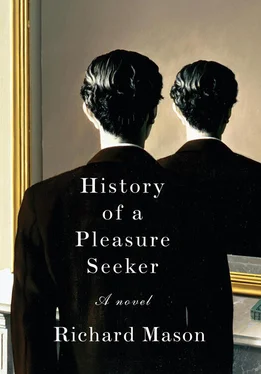When the dark one rose to leave Jay stood to follow. He was surprised to see that the blond one led the dark one. Had they agreed an assignation? It was clear that some intimacy existed between them. He reached the door a discreet distance behind them, keen to learn its nature, but his escape was blocked by a torrent of effusive greeting.
Albert Verignan, founder and chairman of the Loire Lines Company, was a man of influence on both sides of the Atlantic: a plotter who achieved his ends with a guile that did not endear him to Jay Gruneberger, who in all but his sexual life was as straightforward and honest as good manners permit. They greeted each other with noisy amity. With a regretful glance at Piet Barol’s retreating back, Jay allowed himself to be detained in one of his host’s characteristic tête-à-têtes.
Verignan was deftly complimentary. He praised the cut of Jay’s suit and the genius of his wife. “I have never known anyone with such an eye for spectacle, for beauty, for detail, as Rose!” he exclaimed, though he meant that he knew of no one besides himself with such rare talents. “She has chaired the committee superbly — though she might bankrupt me yet, mind you.” He looked down modestly, as he always did when introducing the subject of his own generosity. “She has insisted on having a five-hundred-foot terrace blasted by dynamite from the rock. The line’s timetable has been overthrown and a new route to South Africa added. Really, I should be very cross. But how can one resist her?”
“You have acted wisely not to try.”
Verignan laughed good-naturedly. He knew that Jay Gruneberger did not like him and was determined that he should. Verignan had been a young man when the Prussians invaded France in 1870 and had witnessed the end of the Second Empire on the battlefield at Sedan. The destruction wrought by their advancing armies had left him with a virulent hatred of Germans, which decades of rivalry with the Hamburg-America and Norddeutscher Lloyd Lines had greatly concentrated. He approved of the entente cordiale with Britain, but though Georges Clemenceau seemed a decent patriot he could not forgive him his attempts to impose an eight-hour workday and an income tax. Verignan had lost hope that democracy, with its compromises and debate, its half measures and delays, would rise to the kaiser’s challenge. He had made a fortune by following his instinct and it told him now that an unchecked Germany spelled disaster for France.
The hour called for a hero. And every hero has his maker.
Verignan had chosen his man already, an ambitious young deputy named Colignard. He should be elected democratically and seize power when he had control of the army, as both Napoleons had done. Verignan doubted very much that France could meet the German threat alone, whoever led her. A grand alliance of France, Great Britain, Russia, Poland, perhaps even the United States, would be necessary to check the kaiser’s ambitions. Bringing it about was just the sort of challenge Verignan relished. He understood the seductions of glamour and had devised the voyage to introduce the elites of his favored nations in a setting as conducive as possible to the forging of friendship — a setting, moreover, that would remind them of the priceless contributions France had made to the world. He intended that the ball he had planned should be reported in every illustrated newspaper on earth.
Verignan had chosen St. Helena so that clever journalists might detect a symbolic Anglo-French reconciliation almost a century after the Battle of Waterloo. Its extreme remoteness was a further attraction. The idea of showing five hundred people who thought they had seen everything something they had never seen satisfied his feeling for publicity. So did the notion of transporting them miraculously from the depths of winter to a scented summer’s night. Since he himself was paying for the three hundred waiters, the eighty chefs, the four thousand bottles of champagne, the fireworks, the orchestra, and the dynamiting of a hollow in the rock where the dancing could take place if the weather was fine, the enormous sum raised could be spent directly on needy, photogenic children in each of the countries that formed his imaginary alliance.
These plans shimmered in the air as he remarked how pleasant it was to be with a ship full of friends, and Jay Gruneberger thought wistfully of the men Verignan’s arrival had prevented him from following. He emphatically preferred the dark one.
Noting his abstraction, Verignan remembered hearing that his companion was vulnerable to certain kinds of blackmail. He preferred to gain his ends by charm but was prepared to resort to darker strategies if necessary, since Jay Gruneberger was listened to in quarters whose support would be vital. Whatever must be done for the peace of Europe, he thought.
Auguste Colignard was brought over to be introduced. He was square jawed and inspiring, his manner subtly flirtatious: a man for posters. Jay was compelled to drink a cup of tea with him and spent the afternoon roaming the ship in search of the dark beauty he had missed.
But he had quite disappeared.
Over the next five days, Didier Loubat’s long-mounting infatuation with Piet Barol became a roaring love. They met every morning and were not once challenged. Sometimes they spent six or seven hours together before Piet’s return to tourist class, longer than they ever had in Amsterdam, and the pleasure Piet took in his company made Didier wildly happy. He was a junior steward, assigned as needed. The bounties of the earth were available to first-class passengers at any hour, and wherever he went he took his love and rained delicacies upon him.
“You never speak of your parents,” he observed on the sixth day out as Piet sprawled in the depths of a smoking room sofa, nursing a twenty-five-year-old brandy though it was only eleven a.m. It was an overcast day with an unsteady sea and the paneled room with its cozy fire was almost empty. A copy of Winterhalter’s portrait of the Empress Eugénie presided over the fireplace, her gown rather more revealingly cut than in the original.
“With the Vermeulen-Sickertses to absorb us, it never occurred to me.”
“Will you miss your father?”
Piet contemplated the liquid in his glass. “I don’t suppose so.”
“Not miss your own father?”
“He’s not a very sympathetic man.”
“Is he a drunkard?”
“Heavens no. He’s not vile in that way. In fact, he doesn’t approve much of indulgence in any form. My mother used to say he lacks the gift of joy.”
Didier loved his parents and was well loved in return. That Piet should have no mother, and a father who never embraced him, made him want to care for him forever. Monsieur and Madame Loubat were well accustomed to their son bringing handsome friends home for the holidays. They treated them with great kindness and put them in Didier’s bedroom without remark. As he led Piet from the Renaissance through the reigns of Louis XV and XVI, following his roster from smoking room to salon to the veranda café, he grew ever surer that his mother would love Piet as her own and imagined telling her of him without shame.
The unifying theme of the ship’s decoration was the sea, and Verignan’s decorators had not missed a single opportunity to allude to it. While Didier worked, Piet sat in a haze of contented drunkenness and counted how many gilt shells and crossed L s he could see. It was an extremely pleasant form of self-sedation. Sometimes a single fireplace yielded as many as twenty. In the panels of a double door in the salon he counted eighty-three. It made him feel sophisticated to disapprove of this fussiness and of the embroidered antimacassars, the too-showy reliance on gilt, the ostentatious hats of certain female passengers. But the effect was undoubtedly arresting, and its splendor helped to dull his memories of the Herengracht.
Читать дальше












